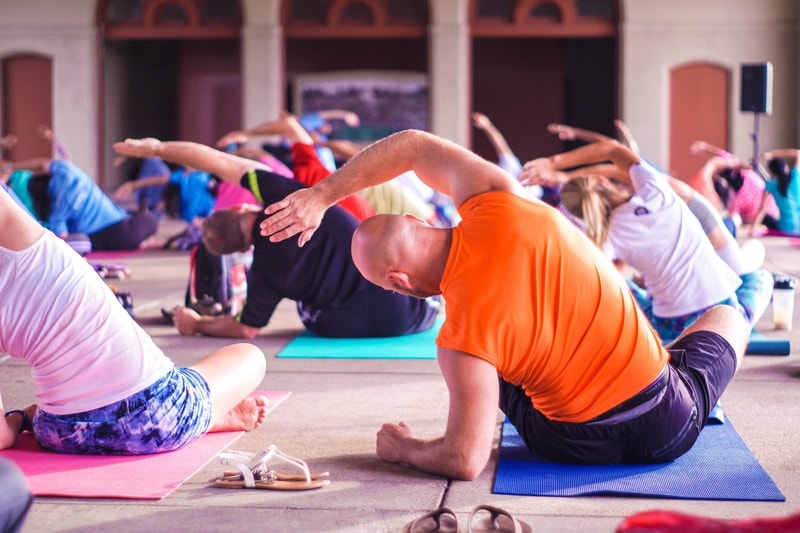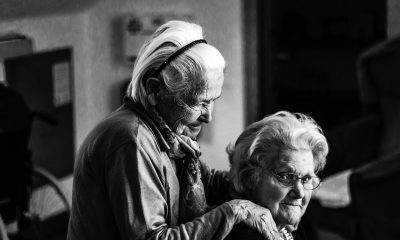You love your aging parents or grandparents and are grateful for the love and care they gave you when you were growing up. Now that everyone’s older, it seems like the roles are reversed. You:
- Tell them when and what to eat and the time to go to sleep
- Help them with their bedtime routine and comfort when they wake up frightened
- Check in with them throughout the day to make sure they’re okay
- Watch them carefully, so they don’t put themselves in harm’s way
- Stay at their bedside when they’re sick and nurse them back to health
- Reassure them when they’re worried, calm them when they’re anxious, and protect them when they’re fearful
In short, caring for loved ones is a full-time job—times four—because family caregivers work around-the-clock, seven days a week to give aging parents the help they need. Though you love them, being a caregiver still takes an emotional, physical, and financial toll on you. Studies show 25 to 50 percent of family caregivers meet the criteria for being clinically depressed, up to six times the national average. Caregivers are also more likely to be overweight and suffer from chronic illnesses like high cholesterol and blood pressure.
The statistics show caregivers need care too. Your self-care is one of the most critical things you can do as a caretaker. If you’re resistant to the idea or don’t think it’s possible for you, the below self-care guide for family caregivers will tell you the way.
Decide Your Self-Care Is a Priority
As caregivers, we often sacrifice our self-care for that of loved ones. Their needs feel more pressing and important than our own. We expend all our energy taking care of them and leave for ourselves, if anything, the scraps of our mental, physical, and emotional reserves.
Caregivers frequently report:
- Not sleeping enough
- Having poor eating habits
- Neglecting exercise
- Working when they’re ill
- Failing to keep doctor’s appointments they make for themselves
Combined with the stress, worry, and fatigue that comes from being a 24/7 caretaker, it’s not surprising caregivers are more prone to chronic illnesses.
When we keep giving day in and day out, we create an emotional deficit within ourselves that makes it hard to be the loving, patient, and dedicated person we strive to be for our loved ones. If our car doesn’t even have fumes to run on, how can we expect to show up as the best version of ourselves?
Caretakers must make their self-care a priority to be able to give back to others. It’s similar to when flight attendants demonstrate safety procedures on planes and advise to first secure and fasten your oxygen mask before helping anyone else, even if it’s your child, spouse, parent, or best friend in the seat next to you. If there’s a drop in cabin pressure and passengers need to use the oxygen mask, putting yours on first assures you remain conscious and lets you help many more people than you would have otherwise been able to.
In the same way, prioritizing your self-care isn’t selfish. It’s necessary. It’s the fuel that will keep you healthy from the inside out so that you can help others.
The Cambridge Dictionary defines “selfish” as “caring only about what you want or need without any thought for the needs or wishes of other people.” This means making self-care a priority is the exact opposite of being selfish because your desire to serve others better is what’s fueling your decision. You also don’t only care about what you want or your needs. The truth is you care so much about the needs of others that you make a conscious choice to refuel your well-being so that you can keep assisting family and loved ones day after day.

Identify and Replace Thoughts That Aren’t Serving You
Our attitudes, beliefs, and misconceptions often hold us back from taking care of ourselves in the way we want. Life coach Brooke Castillo of The Life Coach School teaches that our thoughts create our feelings, which drives our actions and produces our results. In other words, what we do or don’t do is a direct result of the beliefs and attitudes we hold, and our thoughts are a self-fulfilling prophecy.
If your thought is “receiving help shows I’m weak,” you may feel defensive about your self-worth. So you don’t ask for help, you turn down other’s people offers to help, and you do all caretaking tasks yourself. The result is you are solely responsible for all caregiving needs at all times.
When you decide your self-care is a priority, what thoughts come up? Do a brain dump what comes to mind.
Some thoughts that may arise are:
- I don’t have time to exercise
- It’s too hard to eat healthy while caring for another
- Sacrificing myself for my parent proves I love them
- I can’t focus on my weight loss goals right now
- It’s my responsibility to take care of my loved one.
- I promised dad to take care of mom (so I must do it all)
- I’m the youngest sibling in the family (so the caretaking responsibility is mine)
- Caregiving is a family-only responsibility
After you’ve written everything that comes to mind, take a look at your list. All those thoughts feel true, but they are just thoughts. Separate the beliefs that are helping you from the ones that are hindering you. You get to decide if you want to keep the ideas that aren’t serving you or replace them with healthier ones.
For the thoughts you want to change, get curious about how you are proving that belief true. For example, if you believe, “No one will care for my parent like me,” you may feel a sense of obligation to assume the full responsibility of caretaking. What actions are you taking that’s reinforcing that belief? You may avoid asking for help, turn down offers from others, find fault in the way others care for your loved ones, become critical of how others are helping, and more. The result is you don’t allow anyone else to help take care of your parent.
We’ve had some thoughts for so long that we don’t even realize they’re playing in our minds. But thoughts that don’t serve us can cause us to place unreasonable expectations on ourselves, to try and change what’s beyond our control, and keep us stuck in patterns we don’t like. The resulting, worry, stress, and frustration causes us to neglect our needs.
Pull out those thought weeds from your mind’s garden by asking what your thoughts are about a circumstance, and what you want to believe instead.
Don’t Neglect Your Health
It’s tempting to put the health of an aging parent above our own because we love them and want to see them healthy and well. So, we take them to the doctor when they’re sick, ask all the questions, demand tests, and see to it they get the proper treatment.
Yet we’re not so kind and loving with ourselves. Often time we’ll schedule appointments for wellness checkups or because we have concerns, only to reschedule multiple times or cancel altogether. Our actions show we find our existence to be less important than that of our loved ones. But the same way we love our parent, they love us and would never want to see us push our health aside or jeopardize it for the sake of theirs.
If you have a yearly checkup or other health appointment scheduled, treat it with the same urgency and priority you would if it were for your aging parent. In doing so, you’ll always be in the best health possible to meet the strenuous demands of caregiving.
On a day-to-day basis, it may also feel like you don’t have the time to take care of loved ones and take care of you. As a result, things like eating proper meals, taking medications on schedule, and getting the best sleep possible fly out the window. The value of these small tasks is cumulative, and consistently committing to them will impact your overall well-being in a big way. You’ll have better energy and stamina to get through even the toughest of days, and will still have enough in the tank to do more of the things you love.

Carve Out Time Daily to Focus on You
Setting aside time for yourself regularly for something you love to do or that’s important to you can be the difference between feeling burned out and feeling like you can take life’s challenges in stride. Even a few minutes make a lasting impact that carries you throughout the day or recharges your inner well-being. Reading, meditations, devotionals, journaling, prayer, yoga, and running are all popular options, but your “me-time” can be anything you enjoy doing.
If you’re looking to maximize your self-care time, Hal Elrod, author of “The Miracle Morning: The Not-So-Obvious Secret Guaranteed to Transform Your Life (Before 8AM),” writes that by merely changing your morning routine, you can transform your life, lower your stress, gain clarity to overcome challenges, wakeup with more energy, and more.
Based on his studies of successful people throughout the centuries, Elrod noted they performed specific activities in the morning to power up for the day. Some of them did just one or two things, and others did several. He summed up those practices with his acronym, S.A.V.E.R.S., to create the “Miracle Morning.” The letters stand for:
Silence: Anything activity that quiets your mind, including meditation or prayer
Affirmations: Words of encouragement you tell yourself to help overcome obstacles, fears, and maintain a positive outlook, such as quotes you love or inspiring bible verses.
Visualization: Vividly picture in your mind the goals you want to accomplish, how you would reach them, and what you would feel and do once you succeeded.
Exercise: Any activity that gets blood and oxygen flowing through your body and brain.
Reading: Look at and absorb the knowledge of others through books and other literature.
Scribing: Writing or journaling to reflect on your life and increase your awareness.
Elrod proposes that your Miracle Morning routine can be as long or as short as you want. Many take an hour or more from their morning routines to complete all six practices, but even taking only a single minute for each will set you up for an extraordinary day. The author also explains that while many of the greats practiced these every morning, you can just as easily complete them at any time of day.
Make It a Point to Exercise
If exercise could be bottled up, it would be the magic pill the world has been seeking for decades. Multiple studies have shown the effects of exercise are far-reaching and provide a host of benefits to those who consistently perform physical activities. Exercise can even make medications for depression, cholesterol, diabetes, blood pressure, and more unnecessary because it positively impacts almost all systems in the body.
Just a few of the other benefits of exercise include:
- Strengthening your heart and immune system for increased cardiovascular health
- Releasing feel-good hormones like oxytocin
- Reducing the body’s stress hormones like adrenaline and cortisol
- Oxygenating your brain for better mental clarity
- Increasing time spent in R.E.M., the type of sleep that’s most physically restorative
- Improving your circulation for better blood flow and triglyceride levels
The best news is that you don’t even have to put on your jogging shoes to start receiving the benefits of working out if you don’t want to. Any amount of exercise is better than none, and experts say walking can be as good of a workout as running, or better, depending on your current physical conditions and health goals. Studies show that going for a simple 12-minute walk every day boosts your mood, reduces depression, and helps you better cope with stress.
Wrapping It Up
Even the smallest amount of self-care can make a big impact, and it’s not selfish to separate some time where the only focus is you. The more you do for yourself, the more you’ll have to give to others. Decide to commit to your self-care and keep the commitment as your number one priority. What self-care looks like varies from person to person, but ultimately it’s doing the things that replenish your soul, provide rest to your body, and recharge your mind.








